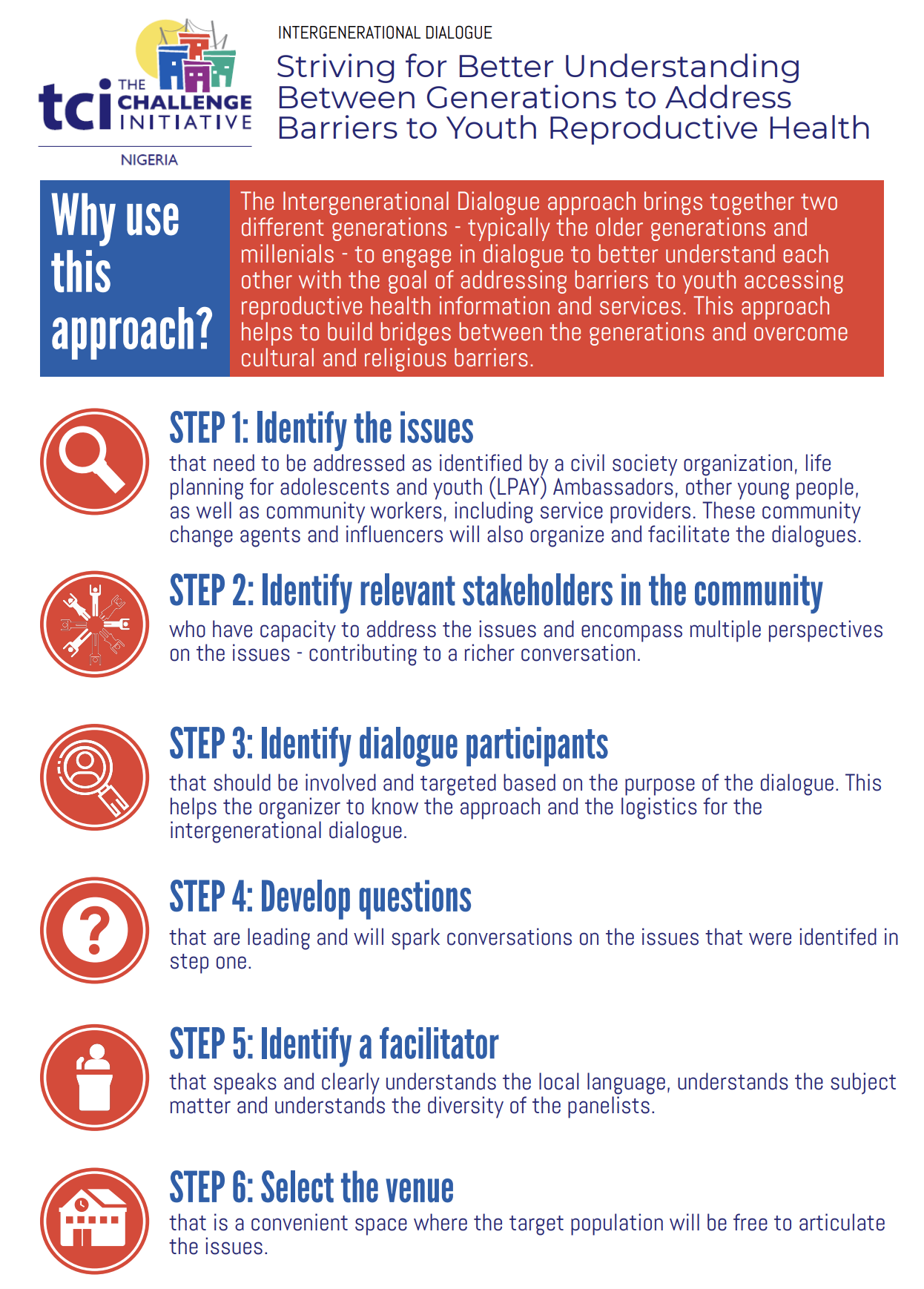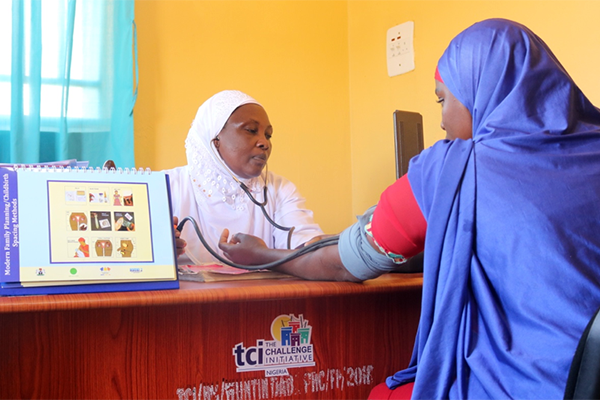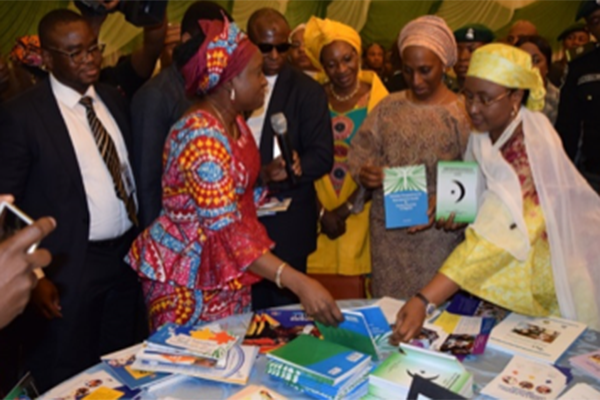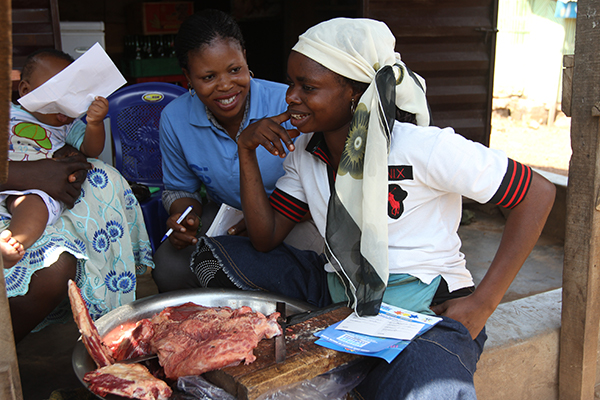Nigeria Toolkit: AYSRH Demand Generation
- Home
- Help and Support
- Close
- Toolkits
- Global Toolkit
- AYSRH Toolkit
- Hub Toolkits
- Core High-Impact Practices
- Gender Essentials Mini Course
- Close
- Resource Collection
- Community of Practice
- Coaching
- Log In/Register
- My Profile
- English
Intergenerational Dialogue
What is it?
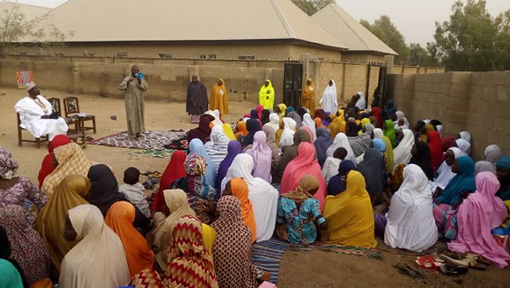 Intergenerational dialogues are organized at the community level by civil society organizations (CSOs), life planning for adolescents and youth (LPAY) ambassadors, as well as the state. It is a forum that brings together two different generations – typically the older generations and millennials – to dialogue to gain a better understanding of each other with the goal to ultimately address some barriers that youth are facing related to their access to reproductive health information and services.
Intergenerational dialogues are organized at the community level by civil society organizations (CSOs), life planning for adolescents and youth (LPAY) ambassadors, as well as the state. It is a forum that brings together two different generations – typically the older generations and millennials – to dialogue to gain a better understanding of each other with the goal to ultimately address some barriers that youth are facing related to their access to reproductive health information and services.
Why is it important?
- It helps to improve access to reproductive information and services for young people at the community level.
- Aids in overcoming cultural and religious barriers to youth’s access of reproductive health information and services
- Helps to build bridges of understanding between the two generations
What steps are taken to implement this approach?
Step 1: Identify the issues to be addressed
The barriers can be identified by a CSO or community-based organization (CBO), LPAY Ambassadors and other young people, as well as community workers including service providers. All these actors identify the various issues militating against access of young people to reproductive health information and services. As community change agents and influencers, they organize and facilitate intergenerational dialogues.
Step 2: Identify relevant stakeholders in the community who have capacity to address the issues
It is important to be strategic about who is invited to take part in the dialogue. It often helps to have multiple perspectives on the issues. For example, the perspective from a government official, religious or traditional leader, community member (parent or service provider), and youth may vary but helpful to having rich conversation.
Step 3: Identification of participants for the dialogue
Based on the purpose of the dialogue, organizers identify who should be involved/targeted groups. This helps the organizer to know the approach and the logistics for the intergenerational dialogue.
Step 4: Develop questions
Identify possible leading questions that will spark conversations. The developed questions must align with the issues identified in step one.
Step 5: Identify a facilitator
The facilitator should speak and clearly understand the local language, understand the subject matter and the diversity of the panelists.
Step 6: Select the venue
The organizers should identify a convenient venue where the target population will be free to articulate the issues (safe space for discussion). As much as possible, choose a public, community-owned space.
Step 7: Conduct an intergenerational dialogue
The facilitator starts by setting the stage and ground rules for the discussion according to the agenda. S/he introduces the panelists and informs the audience as to the purpose of the dialogue, what is the topic that will be discussed and the goal to come to some kind of greater understanding and next steps.
Each panelist speaks about the issue from their perspective and who they are representing in the community. Each panelist is given equal time to give their initial remarks and then listen to the others.
After the panelists speak, the facilitator facilitates a question and answer session among the panelists to gain further clarification and insights into each perspective as well as takes questions and comments from the audience.
As a result, a typical intergenerational dialogue takes at least 2-3 hours. This ensures sufficient time to hear the perspectives from all of the panelists and allow the opportunity for questions from the audience/community members gathered as well as allow the facilitator time to do a recap, identify action points for where there was agreement and next steps. Next steps may include plans for advocacy visits, for example.
Intervention in Action
In Niger State, for example, an outcome or next step from an intergenerational dialogue was the creation of a support group in Lapai local government area (LGA) to push the agenda of adolescent and youth reproductive health forward. This group champions the cause of AYRH within the LGA
TCI APP USERS PLEASE NOTE
You will only receive CERTIFICATES by email – when earning a score above 80% – and will not be able to view or print a certificate PDF from the TCI app.
Test Your Knowledge
Earn a Certificate
Quiz Summary
0 of 5 Questions completed
Questions:
Information
You have already completed the quiz before. Hence you can not start it again.
Quiz is loading…
You must sign in or sign up to start the quiz.
You must first complete the following:
Results
Results
0 of 5 Questions answered correctly
Your time:
Time has elapsed
You have reached 0 of 0 point(s), (0)
Earned Point(s): 0 of 0, (0)
0 Essay(s) Pending (Possible Point(s): 0)
Categories
- Not categorized 0%
- 1
- 2
- 3
- 4
- 5
- Current
- Review
- Answered
- Correct
- Incorrect
-
Question 1 of 5
1. Question
Intergenerational dialogues bring together the older generation and millennials in a community to address barriers youth face in access to reproductive services and information.
CorrectIncorrect -
Question 2 of 5
2. Question
The intergenerational dialogue consists of:
CorrectIncorrect -
Question 3 of 5
3. Question
The only actor involved in organizing an intergenerational dialogue is the state government.
CorrectIncorrect -
Question 4 of 5
4. Question
How useful did you find the information and/or tools presented on this page? Please write your response in the box below using one of the following phrases: Very useful, Useful, Somewhat useful, Not useful.
Feel free to comment on why you made that choice.
-
This response will be awarded full points automatically, but it can be reviewed and adjusted after submission.
Grading can be reviewed and adjusted.Grading can be reviewed and adjusted. -
-
Question 5 of 5
5. Question
How do you intend to use the information reviewed and/or tools that you accessed?
-
This response will be awarded full points automatically, but it can be reviewed and adjusted after submission.
Grading can be reviewed and adjusted.Grading can be reviewed and adjusted. -


